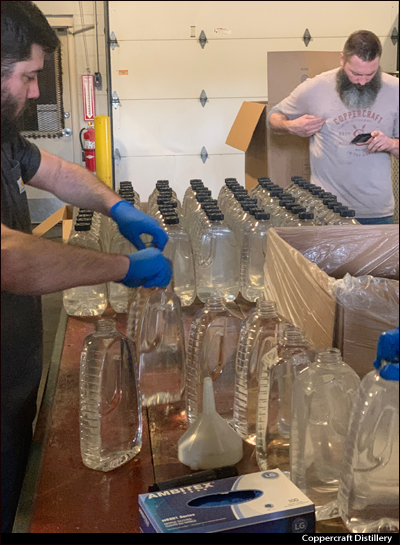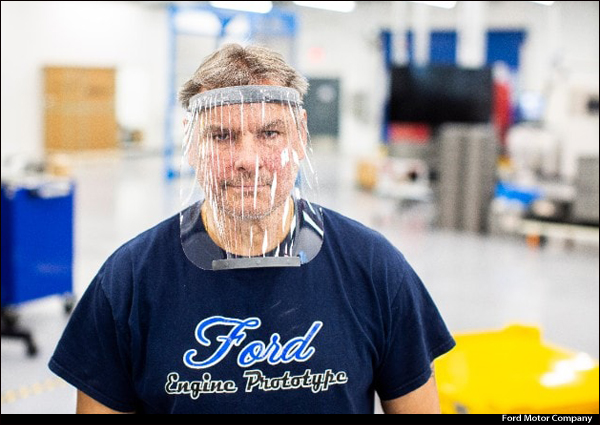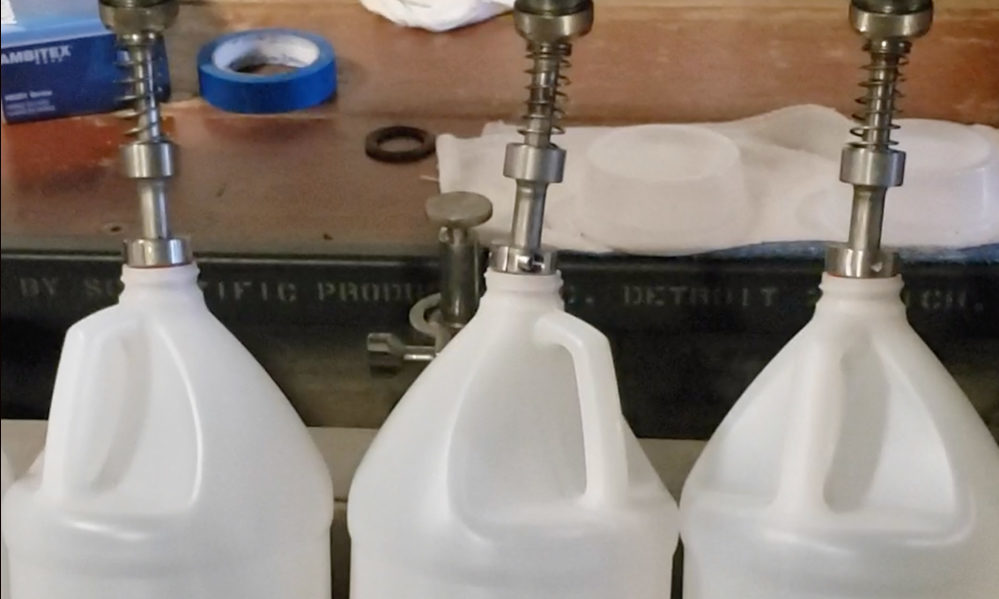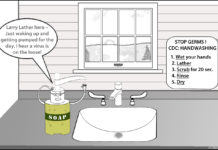March 26, 2020 – Businesses large and small are stepping up to help solve shortages of vital medical equipment and supplies needed by millions of nurses and doctors at hospitals to treat tens of thousands of COVID-19 patients in all 50 states. Coppercraft Distillery of Holland, Michigan is making hand sanitizer. And Ford Motor Company is using parts from its F-150 truck to make ventilators. The American spirit today is an echo of the WWII Home Front and the Arsenal of Democracy.

Hand sanitizer: Coppercraft Distillery
Coppercraft Distillery, founded in 2012, makes premium spirits, bottles of custom craft liquor. Their guiding philosophy is there are no substitutes for superior ingredients, proper aging, and barrel size.
As the COVID-19 pandemic worsened, the spirit of the spirits company drove them to help. Hearing of severe hand sanitizer shortages, their “can do” attitude took over. They are experts in making ethanol, a key ingredient in liquor – and hand sanitizer. It’s a perfect fit.
Ali Anderson, Coppercraft national brand manager, said during a March 25, 2020 phone interview they had two procedures from which to choose to make hand sanitizer. One used ethanol so the choice was an easy one. Hand sanitizers must have a minimum of 60 percent alcohol to be effective, according to the CDC.
After sourcing other ingredients needed (glycerol, hydrogen peroxide and distilled filtered water), the distillery added a production line this week that can produce 800 gallons of sanitizer per batch. They have enough ingredients to make 10,000 gallons of sanitizer, Ali said. Their final formula has 80 percent alcohol. Bottling sanitizer in 32-ounce, half gallon and one gallon containers, they are meeting needs of healthcare communities in Holland and surrounding areas.
Ali said the reaction from across the country has been overwhelmingly positive. They will keep making sanitizer as long as needed or as long as they can obtain ingredients.
SOAP WORKS TOO!
Ventilators and Face Shields
On March 24th, Ford Motor Company announced it is joining forces with firms, including 3M and GE Healthcare, to quickly expand production of urgently needed medical equipment and supplies for healthcare workers, first responders and patients fighting coronavirus. In addition, Ford will be assembling more than 100,000 face shields per week by leveraging its in-house 3D printing capability to produce components for use in personal protective equipment (PPE).

“This is such a critical time for America and the world. It is a time for action and cooperation. By coming together across multiple industries, we can make a real difference for people in need and for those on the front lines of this crisis,” Bill Ford, Ford’s executive chairman, said in a press release. “At Ford, we feel a deep obligation to step up and contribute in times of need, just as we always have through the 117-year history of our company.”
Ford team members are working with 3M to increase the manufacturing capacity of their powered air-purifying respirator (PAPR) designs. They are also working jointly to develop a new design and will be leveraging parts from both companies to meet the surge demand for first responders and health care workers.
To go as fast as possible, the Ford and 3M teams have been resourcefully locating off-the-shelf parts like fans from the Ford F-150’s cooled seats for airflow and 3M HEPA air filters to filter airborne contaminants. Airborne contaminants include droplets that may carry virus particles.
“Working with 3M and GE, we have empowered our teams of engineers and designers to be scrappy and creative to quickly help scale up production of this vital equipment,” Jim Hackett, Ford’s president and CEO, said. “We’ve been in regular dialogue with federal, state and local officials to understand the areas of greatest needs. We are focusing our efforts to help increase the supply of respirators, face shields and ventilators that can help assist health care workers, first responders, critical workers as well as those who have been infected by the virus.”
Reminiscent of WWII Home Front and the Arsenal of Democracy
It’s unbelievably reminiscent of the WWII Home Front and Arsenal of Democracy. Hundreds of millions of Americans are doing their part to defeat an enemy. In 2020, the enemy is a new coronavirus with person-to-person transmission that has rapidly spread around the world. Virologists have already mapped its genome to develop a vaccine, which is currently in clinical trials. In World War II, the first vaccines against the influenza virus were developed. And private pharmaceutical companies played a major role in saving thousands of soldiers’ lives on D-Day through mass production of penicillin. Pfizer devoted enormous resources to produce large quantities of penicillin through deep-tank fermentation at a converted ice factory in Brooklyn, New York. Ford brilliantly applied their assembly method of making autos to manufacturing airplanes at their Willow Run Bomber Plant near Detroit. Few people thought it possible. But American spirit and ingenuity did it and today, the nation is doing it again!
EXTRA! EXTRA!
Vocabulary
2. vital: (adj.) – needed, important, critical
3. sanitizer: (noun) – chemical compound that cleans, sanitizes
4. ventilators: (noun) – machines that breathe for a patient who cannot breathe on their own
5. substitutes: (noun) – things that are used in place of something else, alternatives
6. superior: (adj.) – better than anything else, the best
7. ingredients: (noun) – items or components that go together to make a product or food
8. attitude: (noun) – state of mind of how someone feels about something, either positive or negative
9. effective: (adj.) – noted by working and having an impact or effect on something else
10. surrounding: (adj.) – around in a geographic context; nearby
11. urgently: (adverb) – critical, must be addressed right away to fix or cure
12. assembling: (verb) – putting pieces (or people) together to make a whole
13. leveraging: (verb) – using something to help or make another process easier or possible
14.capability: (noun) – the state of being capable, able to do something so that it works or meets goals
15. critical: (adj.) – vital, needed, very serious
16. cooperation: (noun) – actions of people working together, cooperating
17. multiple: (adj.) – many
18. obligation: (noun) – promise, need or requirement to do something
19. jointly: (adverb) – together
20. resourcefully: (adverb) – creatively, with resources
21. airborne: (adj.) – noted by being in the air
22. contaminants: (noun) – particles that contaminate or make something not clean, pure or ideal
23. empowered: (verb) – given what is needed to get something done; strengthened
24. dialogue: (noun) – talk, conversation between two or more people
25. unbelievably: (adverb) – cannot believe, amazing
26. reminiscent: (adj.) – having the quality of jogging the memory because of similar events or time
27. virologists: (noun) – people who are experts in viruses
28. pharmaceutical: (adj.) – related to medicine, pharmacy that dispenses medicine
29. ingenuity: (noun) – state of being creative, innovative, able to solve problems with new ways of doing things
Review Questions
1. Why did Coppercraft Distillery decide to make hand sanitizer?
2. What product does Coppercraft Distillery normally make?
3. What product is Ford Motor Company making by using its 3D printers?
4. What are the ingredients in hand sanitizer?
Inquiry Questions
1. Why is the work of Coppercraft and Ford reminiscent of the WWII Home Front and the Arsenal of Democracy?
2. Even though both companies are based in Michigan, why is this story national in scope?
3. How is Ford meeting the urgent need for face shields with creative solutions when normally, designing a new product would take months or years?
4. What figure of speech is used in the headline? Discuss.
Audio recording of the Article




